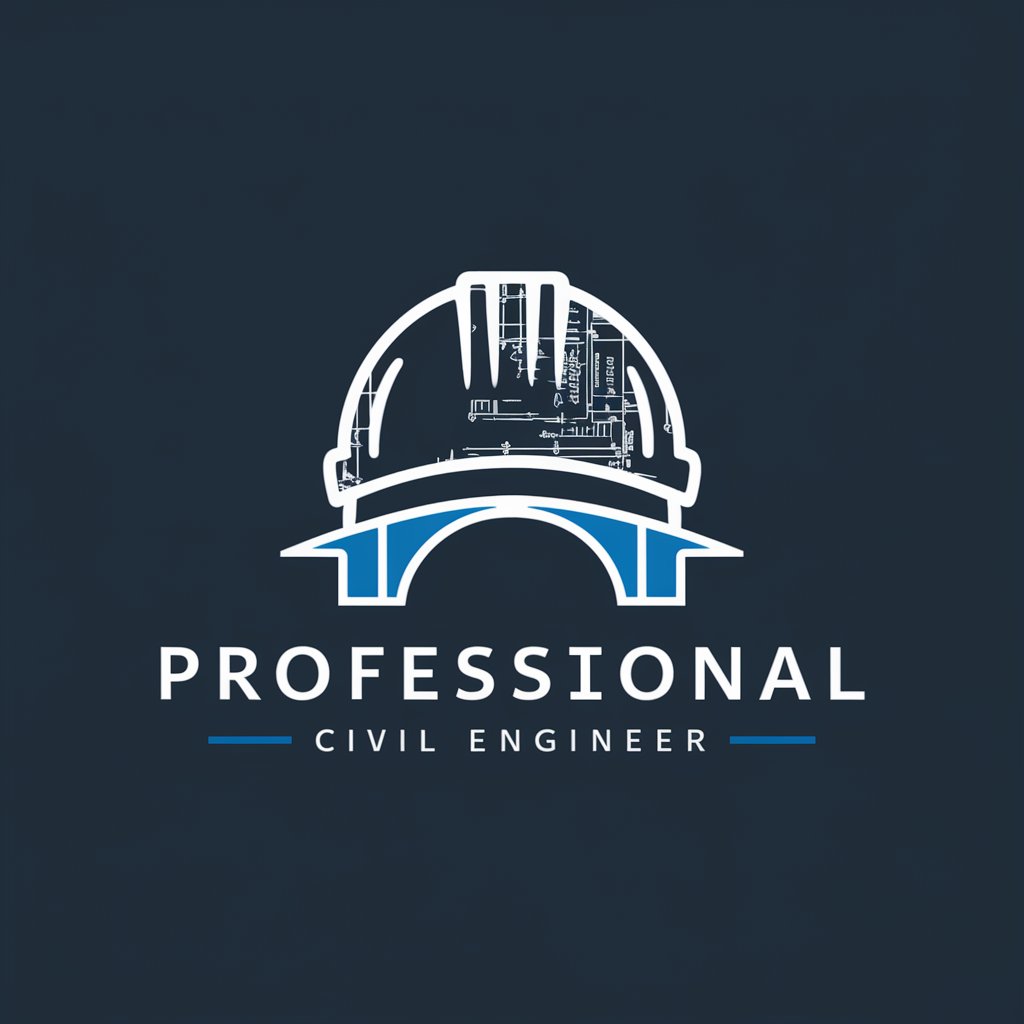Professional Civil Engineer - Civil Engineering Insights

Hello, let's solve your engineering challenges together.
AI-driven Civil Engineering Expertise
How can we optimize the structural integrity of a multi-story building?
What are the best practices for sustainable urban drainage systems?
Can you provide an analysis of soil stabilization techniques for road construction?
What factors should be considered when designing earthquake-resistant structures?
Get Embed Code
Overview of Professional Civil Engineer
A Professional Civil Engineer is an expert specialized in planning, designing, constructing, and maintaining the physical and naturally built environment. This encompasses a wide array of structures and systems, including roads, bridges, buildings, water supply networks, and sewage treatments. The core purpose of a Professional Civil Engineer is to ensure the safety, sustainability, and resilience of infrastructure projects. They apply principles of mathematics, physics, and engineering science to solve complex problems, optimize designs, and enhance the functionality and efficiency of infrastructure within societal and environmental constraints. For example, in designing a bridge, they must consider factors such as load capacity, materials, environmental impacts, and budget constraints to ensure a durable and safe structure. Powered by ChatGPT-4o。

Core Functions of Professional Civil Engineer
Structural Engineering
Example
Designing a multi-storey parking garage to withstand various loads, including vehicles, human traffic, and environmental stresses.
Scenario
In a densely populated urban area, the engineer calculates load distributions, selects appropriate construction materials, and incorporates seismic design principles to ensure stability and longevity.
Transportation Engineering
Example
Developing a new highway system to improve connectivity and reduce traffic congestion.
Scenario
Considering factors like land availability, environmental impact, and future growth, the engineer designs a highway layout that optimizes traffic flow, incorporates sustainable materials, and includes safety features for motorists and pedestrians.
Water Resources Engineering
Example
Designing a flood management system to protect a coastal city from storm surges and sea-level rise.
Scenario
Analyzing historical flood data and climate change models, the engineer proposes a combination of sea walls, drainage systems, and land use planning to mitigate flood risks and protect vulnerable ecosystems.
Environmental Engineering
Example
Implementing a waste management plan for a growing municipality to reduce landfill use and increase recycling.
Scenario
By assessing waste generation patterns and community needs, the engineer designs a comprehensive waste management system that includes efficient collection processes, recycling programs, and waste-to-energy facilities.
Target User Groups for Professional Civil Engineer Services
Government Agencies
These include city planners, transportation departments, and environmental protection agencies seeking expertise in developing and maintaining public infrastructure projects that meet community needs and regulatory standards.
Construction and Development Firms
Companies engaged in the construction of buildings, highways, and other infrastructure projects require civil engineering services for design, analysis, and project management to ensure projects are safe, efficient, and economically viable.
Utility Companies
Water, gas, and electric utilities need civil engineers to design, upgrade, and maintain their distribution systems and facilities, ensuring reliable service delivery and compliance with environmental regulations.
Environmental Organizations
Groups focused on conservation and sustainable development collaborate with civil engineers to design projects that minimize environmental impacts, promote resource conservation, and leverage green technologies.

Guidelines for Using Professional Civil Engineer
Step 1
Visit yeschat.ai for a complimentary trial, accessible immediately without any need for login credentials, nor a subscription to ChatGPT Plus.
Step 2
Identify the specific civil engineering query or challenge you are facing. This could range from structural analysis to water resources management.
Step 3
Utilize the query input box to describe your issue or question in detail. The more specific you are, the more tailored the advice or solution you will receive.
Step 4
Review the provided solutions or guidance carefully. Apply the technical advice to your project, considering any necessary adjustments based on project-specific conditions.
Step 5
For complex or ongoing projects, consider documenting your interactions for future reference. This can aid in project continuity and provide a knowledge base for similar future challenges.
Try other advanced and practical GPTs
Le ingénieur Génie Civil
AI-powered civil engineering guidance

Civil 3D AutoLISP Alchemist
AI-Powered AutoLISP Crafting for Civil 3D

Chinese Civil Code Advisor
Decoding Chinese Law with AI

French Civil Code
Deciphering French Law with AI

Civil Legal Challenger
Navigate Texas Law with AI

Civil rights
Enhancing text generation with AI

Birdwatch Expert
Elevate Your Birdwatching with AI

Unreal Expert
Powering Unreal Creativity with AI

Conversion Expert
Empower Your Pages with AI Insights

Security-Dude
Empowering Cybersecurity with AI

Homeland security
Powering Security Insights with AI

Security Analyst
Empowering Security Through AI

Professional Civil Engineer: Detailed Q&A
What types of civil engineering problems can Professional Civil Engineer solve?
This AI tool can address a wide array of civil engineering challenges, including structural integrity assessments, materials selection, hydrology and water resources management, geotechnical analysis, transportation planning, and construction project management.
How does Professional Civil Engineer stay updated with current engineering standards?
Although the AI's training includes vast historical data, it relies on users to reference the latest codes, standards, and regulations in their queries to ensure advice remains current. Continuous updates and user feedback help refine its responses over time.
Can Professional Civil Engineer assist with engineering design?
Yes, it can provide foundational guidance on design principles, recommend practices for sustainable and resilient design, and offer calculations for simple components. However, detailed design work should be validated by a licensed professional engineer.
Is Professional Civil Engineer capable of providing project management advice?
Yes, it offers advice on project management methodologies, risk management, scheduling, budgeting, and resource allocation strategies that are crucial for the successful execution of civil engineering projects.
How can users optimize their interaction with Professional Civil Engineer for complex queries?
For complex queries, users should provide comprehensive background information, specify any particular methods or solutions they are considering, and break down their questions into manageable parts. This approach helps in generating precise and actionable responses.
